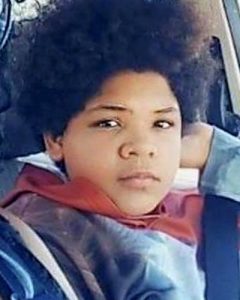
by Stacy M. Brown – NNPA Newswire Senior National Correspondent – @StacyBrownMedia – (Source: atlantadailyworld.com) – When the National Center for Missing and Exploited Children (NCMEC) posted a photo of 14-year-old Isaac Gastelum on Twitter, the response was telling.
“This has been almost a month since he went missing,” an individual with the Twitter handle @SdMerlins responded. “Do you guys need help with disseminating info?”
The answer remains a resounding yes.
Isaac, an African American with brown eyes and black hair, hails from Oliver Springs, Tennessee.
NCMEC’s alert noted that the five-foot-tall and 150-pound Isaac “may still be in the local area, or he may travel to California or Michigan.”
He has been missing since May 12, 2021.

About one month after Isaac went missing, 15-year-old Aliyah Hardridge of Ottawa, Kansas, disappeared. NCMEC describes Aliyah as 5-feet-7 inches tall and 195 pounds.
Aliyah has brown eyes and black hair and was last seen on June 13.
The National Newspaper Publishers Association (NNPA) continues its series on the plight of missing African American girls and boys who have disappeared.
Throughout the series, which began in 2019, a common theme emerged: Black children who go missing receive far less media coverage and police priority than White children.
Reportedly, there are 425,000 missing children in America, and 40 percent – or 156,000 – are Black.
Other than by their families, neighbors, and friends, most of these young people can be forgotten — even by law enforcement officials charged with solving the ever-growing body of cold cases.
When it comes to missing African Americans, the media is often silent.
A Google and Yahoo! Search yielded no news articles about Isaac or Aliyah.
The apathy is palpable, particularly on social media.
“Hope [Aliyah] is not a runaway,” posted Twitter user @JR3154. “Maybe at a friends’ house and mad at her parents.”
In the same thread, user @Red_Dark_N_Blue added: No Amber Alert in the hood … I guess.” Revealing similar apathy and perhaps some sarcasm, the user continued: “We don’t snitch … so we go missing?”
The work of NCMEC and organizations like the Black and Missing Foundation and the African American Juvenile Justice Project serve to keep a spotlight on the missing.
“Black, African American, and Afro Latinas are less likely seen as victims,” Sherri Jefferson of the African American Juvenile Justice Project told NNPA Newswire earlier this year.
Awareness is a significant component to getting a missing person home safely, said B.J. Spamer, the executive director of the National Missing and Unidentified Persons System (NAMUS).
The organization counts as a nationwide information clearinghouse that offers free, secure, and easy-to-use technology to help expedite case associations and resolutions.
NAMUS also provides free forensic services, investigative support, victim services, and training and outreach.
In an earlier interview with NNPA Newswire, Spamer explained that the media highlights certain cases.
However, many others fail to get the same attention.
“The media plays a huge role in making sure that we raise awareness for all missing persons and also be able to raise awareness of the tools that families have available to them that they may not know are available,” Spamer remarked.
“We have had families sit down at the keyboard to search the database and find their loved one, essentially resolving their own case.
She continued:
“It’s an empowering thing to have families to be able to participate in the search using certain tools that we make publicly available. There are so many resources available today that didn’t exist 20 or 30 years ago when their loved one may have gone missing.
“We would love to see those families come forward today and provide whatever information they still have on their loved one because we are routinely seeing identifications on cases that are 20,
30, or 40 years old. And so as long as there’s a searching family member, it is never too late to file a report, get that case in NAMUS and potentially find a match and bring resolution to that family.”
Anyone with information about Isaac Gastelum or Aliyah Hardridge should call 911 or 1-800-843-5678.

Be the first to comment